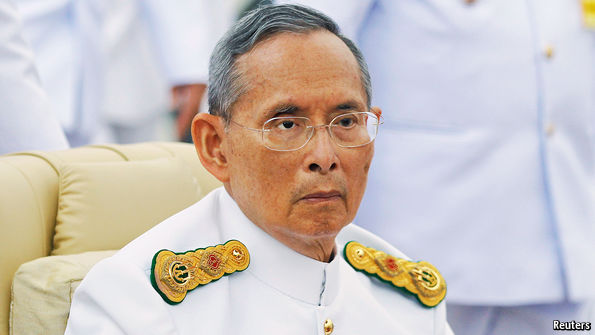
The politics of Thailand
The generals who hide behind the throne
Thailand is ill-prepared for the death of its king
The Economist | 21 July 2016
TO THE tourists who still flock to its beaches and golden temples,
Thailand seems calm. But this is an illusion. Thai politics are as ugly
as the country is beautiful—and could soon get uglier. The country’s
beloved king, Bhumibol Adulyadej, whose 70th year on the throne was
celebrated on June 9th, is 88 years old and gravely ill. The country is
scared of what might happen when he dies (see article).
Were Thailand a normal democracy with a constitutional monarchy, the
death of a king would cause national sorrow but not political
instability. Alas, it is not. Two years ago the army seized power in a
bloodless coup. An “interim” constitution grants the prime minister and
junta leader, Prayuth Chan-ocha, almost unlimited power. Because the
regime is illegitimate, it hides behind Thailand’s most revered
institution.
Its propagandists do all they can to fizz up adulation of the
monarchy; for example, by building colossal statues of seven Thai kings.
And the regime has applied Thailand’s strict lèse-majesté
laws with ferocity, arresting people for the slightest perceived insult
to the dignity of the king, his family or even his pet dog. Those
deemed to have defamed his majesty face up to 30 years in prison. This
creates an atmosphere in which critics of the government, too, can be
bludgeoned into silence.
Whereas Mr Prayuth rambles self-righteously on his weekly television
show, opposition parties are gagged and parliament stuffed with the
junta’s allies. The regime has hauled critics to army bases for
“attitude adjustment”. It has charged Thailand’s former prime minister,
Yingluck Shinawatra, with neglect-in-office, and may hand her ten years
in jail. The army’s latest ploy is a new constitution, which would allow
fresh elections but keep the next government subservient to a nominated
senate and a handful of junta-stacked committees. It hopes to win
public approval for this plan in a referendum on August 7th. Just to
make sure, it has trained bureaucrats to “explain” the charter to
voters, but it forbids civilians from campaigning against it, on pain of
a ten-year prison sentence.
Indeed it was, but probably no more so than most Thai governments.
The army’s excuses for seizing power are wearing thin. Thailand has seen
a dozen successful coups since the 1930s and a new constitution on
average every four years. The army typically installs conservative
governments that favour the urban elite. That has entrenched inequality
and infuriated the rural poor. Mr Thaksin won two elections by wooing
poor voters with free public health care and subsidies for farmers. He
may have left the scene, but his supporters are still there.
The army has long defended its coups by claiming to have the king’s
support. After taking power, coup-leaders have always trekked to the
palace to receive royal assent. But if King Bhumibol is succeeded by the
crown prince, who is unpopular, the claim of royal approval will count
for less. Elites fret that the succession will disrupt long lines of
patronage which for generations have shovelled wealth and influence
their way. They fear that anti-government activists will seize the
chance to push for big changes in how the country is run.
Little time, much to do
With luck, the succession will pass peacefully. But securing
long-term stability will require reforms that the army may not like.
Royals should speak out against the lèse-majesté
law (which King Bhumibol has already once condemned, in 2005). The
generals must allow Thais the freedom to debate the new constitution. A
better one would be more like the 1997 charter, so far Thailand’s best.
If and when the soldiers return to barracks, they will need pruning:
their idle ranks include more generals and admirals than America’s armed
forces, which serve a superpower nearly five times as populous.
Politicians must rethink, too. Thailand’s middle classes may find
Thaksinite populism abhorrent, but they have failed to provide poorer
Thais with an alternative. The Democrat Party, the establishment’s main
political outfit, has been squealing about the generals’ stifling rule.
But for years it has put off the groundwork needed to win an election,
betting instead that friends in the army or judiciary will help it. Any
lasting solution will require decentralising power to the provinces.
Untangling this mess will take years, but it is not impossible. If
the junta blocks reform, allies such as America should impose financial
sanctions and travel bans on its leaders and their cronies. Thailand
needs a civilian government that is accountable to voters and the law,
not to the men with guns.


No comments:
Post a Comment